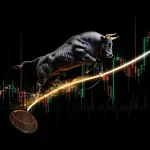Psychological Effect: Unveiling Its Addictive Grip on Investors
Jan 25, 2025
The psychological effect is not your enemy. It is the fire that forges discipline, the storm that reveals navigators from drifters. Master it, and you master the oldest game: the human mind against itself.
The Serpent in the Garden: How Markets Weaponize Human Weakness
Let us speak plainly: investing is not a science. It is a gladiatorial arena where reason battles instinct, and the crowd’s roar is the siren song of self-destruction. The psychological effect—that invisible puppeteer—transforms rational actors into addicts, chasing euphoria through rising tickers and hollow promises. To understand this force is to see markets for what they are: a hall of mirrors designed to distort desire, amplify fear, and enslave the mind. In a world where success is a fleeting shadow, investors fall prey to an illusion of control, believing they can conquer the beast when, in fact, they are becoming its prey. The market doesn’t care if you win or lose. It thrives on your compulsion to play, knowing that as long as you’re addicted, you’ll keep feeding it.
Consider the trader who checks his portfolio 50 times daily, sweat beading as red numbers flicker. Or the retiree pouring savings into a “groundbreaking” AI startup because her neighbour did. These are not calculated risks—they are symptoms of addiction, a dopamine-fueled dance with danger. With its siren song, the market turns self-control into a rare commodity and, in doing so, turns human beings into gamblers. But it is no accident—this game is rigged from the start. The market doesn’t offer opportunities, it manufactures the craving for them. You aren’t investing—you are seeking your next fix. The lines between the thrill of the game and the logic of investment blur until they are indistinguishable.
The Anatomy of Addiction: Dopamine, Delusion, and the Double-Edged Sword
Addiction begins with a lie: this time will be different. The brain, that flawed machine, mistakes volatility for vitality, risk for reward. Every green candlestick, every bullish headline, floods the cortex with dopamine—the same chemical that hooks gamblers and lovers. But here’s the cruelty: the market’s highs are fleeting, its lows interminable. The addiction lies in the paradox—the reward is immediate, but the pain always follows. The brain’s insatiable craving for dopamine blinds the investor to the stark reality that the market’s highs are always short-lived and are followed by periods of unbearable lows.
Study the 17th-century Tulip Mania. Dutch speculators traded homes for flower bulbs, not because tulips had intrinsic value but because the act of trading became the drug. Modern parallels abound: Bitcoin’s 2017 frenzy, where “HODL” morphed from typo to cult mantra, or the 2021 SPAC boom, where blank-check companies became proxies for hope. The substance is irrelevant; the addiction is universal. In every case, investors are seduced by the prospect of a high without understanding the inherent risk. History repeats itself because human psychology remains constant, driven by the promise of easy riches and the avoidance of loss. They fail to realise that the market is not a source of wealth—it is a trap set to capture the soul.
Actionable Insight: Track your emotional triggers. If a stock’s movement keeps you awake—whether in ecstasy or dread—you are not investing. You are feeding a habit. Break the cycle. Stop measuring success by fleeting moments of adrenaline. Instead, measure it by rational, long-term strategy.
The Casino’s Playbook: How Markets Engineer Compulsion
Casinos wield psychology like scalpels. Flashing lights, free drinks, near-miss jackpots—all designed to blur risk and reward. Markets are no different. Brokerage apps gamify trading with confetti animations and “streaks.” Algorithms push options contracts to day traders like a bartender pushing top-shelf liquor. The goal? To make you feel skilled when you win, and unlucky when you lose—never responsible. The casino knows one thing: it doesn’t matter how much money you lose—it only matters that you keep playing. In this rigged game, the house always wins, even when it’s you who’s sitting at the table.
Robinhood’s rise was no accident. Its interface, slick as a slot machine, turned millennials into day traders overnight. But when GameStop soared 1,500% in 2021, the platform froze buys, exposing the truth: the house always controls the game. Those who profited were not the addicts but those who sold the shovels—market makers, payment-for-order-flow brokers. The real winners are not the gamblers who chase the highs but the orchestrators who pull the strings from behind the scenes. They control the game’s flow, the ebb and tide of your fortunes. You are not playing; you are being played.
Strategy: Become the house. Sell covered calls on hyped stocks during IV spikes. Let the addicted chase peaks; you harvest premium from their frenzy. Build strategies that turn the addicts’ impulsive plays into your stable profits. In the world of addiction, you can either be the junkie or the dealer. Choose wisely.
Breaking the Cycle: From Slave to Strategist
To escape addiction, one must first admit enslavement—a truth as old as philosophy itself. The investor who claims immunity to fear or greed is either a liar or a fool. Mastery lies not in suppressing emotion, but in weaponizing it. The most dangerous lie investors can tell themselves is that they are immune to the emotions that drive the market. The true path to success lies in embracing and mastering these emotions, not in denying them.
Warren Buffett’s “fearful when others are greedy” mantra is often quoted but rarely practised. Why? Because it demands cold detachment in a feverish world. In 2008, as Lehman collapsed, most sold in panic. The sober-minded bought Bank of America at $7 and Coca-Cola at a 15% yield. They did not lack fear; they used others’ fear as a compass. While the masses ran for the exits, the few who understood the market’s true nature found opportunity in the chaos. They let the crowd’s emotional collapse become their entry point.
Tactic: Create a “panic portfolio.” Allocate 10% of capital to assets you’ll only buy when headlines scream doom. When the next crisis hits, you’ll have a playbook, not a prayer. This is where wealth is forged—not in calm times, but in the crucible of fear. Those who understand the rules of the psychological game can turn panic into profit.
The Myth of Control: Why Knowledge Alone Fails
Here is the bitter pill: education cannot cure addiction. The day trader who reads Kahneman still overtrades. The crypto bro who studies Satoshi still turns tokens into meme coins. Why? Because addiction bypasses logic. It thrives on the illusion of control—the belief that this chart pattern, this insider tip, will be the fix. In truth, knowledge alone is no defence against the psychological forces that drive the market. Even the most learned investor is powerless when their emotions are in the driver’s seat. Understanding the market’s mechanics is not enough. The true battle is within.
Modern portfolio theory preaches diversification, yet the average investor holds 3-4 stocks. Why? Concentration feels like an agency. Losing $10k on Tesla stings less than missing a 500% surge. The pain of regret outweighs loss—a flaw etched into our DNA. The desire to feel in control, to believe that the next move will be the right one, drives investors to concentrate their bets. This is the trap: they mistake action for progress and risk for control.
Imperative: Automate ruthlessness. Set trailing stops at 15%, schedule portfolio reviews quarterly, and delete trading apps from your phone. Freedom lies in self-imposed chains. You can’t trust yourself to make emotional decisions in the heat of the moment. Design your portfolio with the precision of a general who has already planned the battle.
The Phoenix Paradox: Burning to Rebuild
Addiction ends in one of two ways: collapse or reinvention. The 2000 dot-com crash wiped out day traders but birthed value investors. The 2022 crypto winter buried speculators but unearthed builders focused on utility over hype. To transcend the psychological effect, you must let your old self burn. Rebirth is a violent process, but from the ashes, the true investor rises.
Consider Jesse Livermore, the 1920s “Boy Plunger.” He made and lost fortunes betting on momentum, dying bankrupt. Contrast George Soros, who shorted the British pound not on whim but on tectonic shifts in policy. Both men felt the market’s pull; only one let it refine, not define him. Livermore was a slave to the market’s pulse. Soros, however, was the master, using the market’s movements as tools, not as chains.
Actionable Insight: Write your investing obituary today. What will your legacy be—a cautionary tale or a blueprint for reinvention? The difference lies in whether you let the market break you or whether you break it first.
The Sovereign Investor: Reclaiming Power in a Designed World
The final truth is this: markets are not your therapist, parent, or god. They are a mirror, reflecting your hunger at you. The sovereign investor stares into that mirror and laughs. They see the psychological effect not as a threat but as a tool—a hammer to shatter herd mentality, a lens to spot others’ addictions. The true power lies not in chasing the market but in understanding that the market, at its core, reflects the desires and fears of the masses. By mastering your own desires, you can manipulate those of others.
In 2023, as AI stocks like those of NVIDIA skyrocketed, the true savvy players were not the ones betting against the trend but those who recognized that the real opportunity lay in the underappreciated infrastructure—like Taiwan Semiconductor. NVIDIA might have been the flashiest player in the AI game, but Taiwan Semiconductor was the unseen force supplying the very chips that powered the revolution. These players understood that while the masses were focused on the glitzy allure of AI headlines, they were ignoring the foundational giants that would see continued growth regardless of the hype. The savvy investor didn’t get distracted by the euphoria—they bought the quiet, steady infrastructure poised to reap the long-term rewards.
The real wisdom lies in identifying where the true value exists, not just riding the immediate wave of euphoria. Markets thrive on herd mentality, but those who step outside the noise can position themselves to profit from the forces shaping the future, even if they aren’t the ones holding the most visible assets.
Final Charge: Feed others’ addictions to starve your own. Sell euphoria, buy despair. In the casino of markets, be the quiet figure counting chips while others chase ghosts. Be the calm amidst the storm. Let the addicts play their game while you make your strategy work for you.













